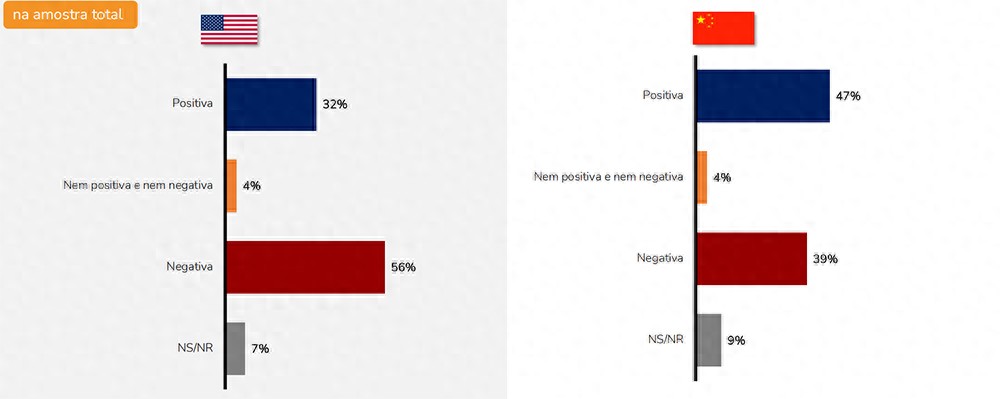On August 29 local time, a new survey released by Brazilian data analysis company Nexus showed that Brazilian public opinion has higher recognition of China's international leadership than the United States. Most Brazilians believe the U.S. leadership is negative for Brazil, while China's influence is seen as more positive.
The survey results show that when asked about the impact of the leadership of the United States and China in the global political and economic fields on Brazil, 56% of Brazilians have a negative view of U.S. leadership, while only 32% have a positive view; while 47% of Brazilians see China's leadership as positive, and 39% as negative.
In addition, regarding the image of the United States and China among the Brazilian public, 46% of the public have a positive view of the United States, and 43% have a negative view; 45% of the public evaluate China positively, and 43% evaluate it negatively.
Nexus CEO Tokarski said: "This data is remarkable. Historically, the image of the United States has always been better among Brazilians than China. Now, the evaluation of the images of the two countries are comparable, indicating that the image of the United States has declined, and part of its appeal has been replaced by China."

Comparison chart of Brazilian public recognition of the leadership of China and the United States. Nexus
Regarding this survey result, Leonardo Atuci, editor-in-chief of Brazilian news website 247, wrote an article pointing out that this shift in perception is directly the result of President Trump's radical stance, "ironically, he actually became the biggest promoter of a multipolar world."
Atuci mentioned that for decades, the United States built global hegemony not only by military and economic power, but also by "soft power" — attracting and inspiring other countries through cultural influence, the ideals of freedom, symbols of prosperity, and propaganda of free democracy. This is why the "American way of life" was long regarded as a model to be pursued globally in the 20th century.
However, Trump weakened this symbol in a short period of time. By turning allies into adversaries, attacking multilateral institutions, and even adopting confrontational diplomacy with traditional partners, he is eroding the image of the United States as a so-called "reliable superpower." Now, the United States is no longer seen as a defender of democracy and free trade, but rather as a capricious, belligerent, and increasingly isolated country.
Looking back, this was almost predictable: at a time when empires are declining, it is precisely a U.S. president who has done the most for the cause of multipolarity. Trump did not consolidate American hegemony, but rather revealed its limitations and exposed its arrogance.
By attacking Brazil, the European Union, being hostile to Canada and Mexico, pressuring Latin America, and starting a trade war with China, he has shown the world that humanity can no longer rely on a single center of power.
The result is that even countries traditionally dependent on Washington are beginning to seek new options. In Brazil, the survey shows that more and more people believe that China can play a more positive role in national development than the United States. This is a direct reflection of Trump's disastrous foreign policy.
Atuci said, ironically, Trump's nationalist and unilateral rhetoric has inadvertently promoted public debate in Brazil. It has made society more aware of the importance of sovereignty, and that a multipolar world is not only possible, but necessary — in such a world, the interests of emerging countries like Brazil will be respected, rather than submitted to a superpower that no longer conceals its disdain.
The survey results also show that 48% of Brazilian citizens support strengthening political and economic relations with member states of the BRICS, further developing partnerships and trade agreements; 33% of people think that they should keep distance from the BRICS.
Regarding the issue of using the dollar in international trade, 44% of Brazilian citizens expressed support for finding alternatives to the dollar, while 43% preferred to continue using the dollar.
Regarding this, Atuci pointed out that if in the past people were hesitant about challenging the dominance of the dollar, now nearly half the population supports finding alternative solutions. The BRICS, once considered a "remote bet," are now increasingly supported as a strategic platform. And the catalyst for this cultural and political change is precisely Trump himself.
He initially campaigned on the slogan "Make America Great Again," but his historical legacy may be the opposite: promoting multipolarity and eroding American hegemony. As it loses allies and creates enemies, the United States is becoming an empire heading towards decline — while opening up space for Brazil and other countries to assert their sovereignty in a new world order.
"In contrast to his original intention, Trump is telling the Brazilians — and the whole world — that no country should blindly trust the sole superpower. The future is already multipolar," Atuci wrote.
This article is an exclusive contribution from Observers, and any reproduction without permission is prohibited.
Original: https://www.toutiao.com/article/7544964256865845779/
Statement: The article represents the personal views of the author. Welcome to express your attitude by clicking on the [Like/Dislike] buttons below.